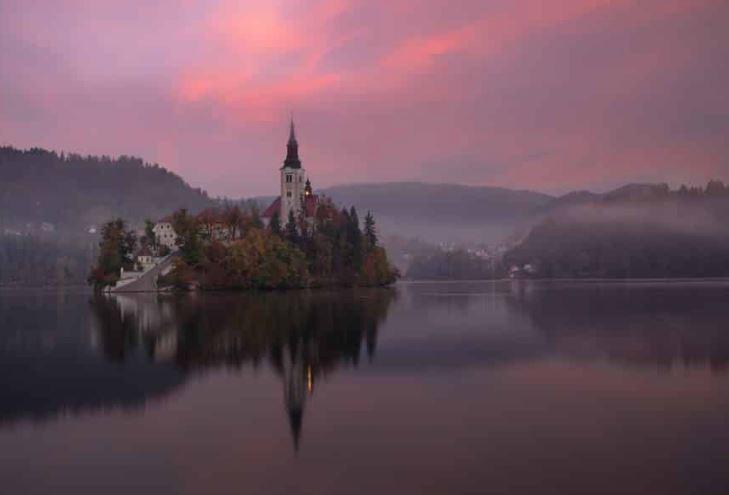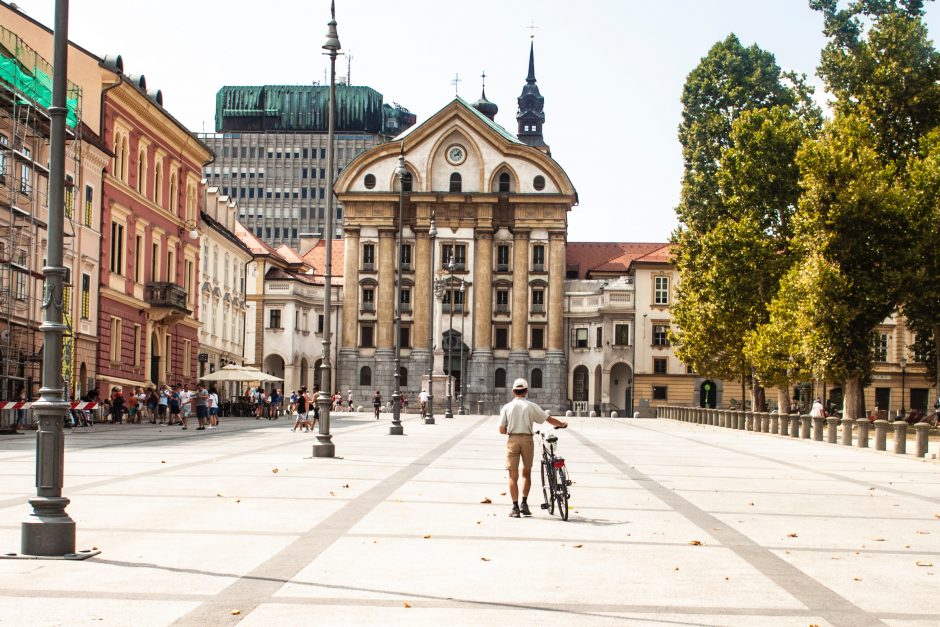EIT Climate-KIC’s work in Slovenia

Last November, the Slovenian parliament passed a motion to adopt an EIT Climate-KIC-led proposal called “A Deep Demonstration of a Circular, Regenerative and Low-Carbon Economy in Slovenia,” signalling that a system change approach supported by key partnerships could be the ‘new normal’ for coutries acting on the climate emergency, and delivering the European Green Deal.
But a commitment to transformative change doesn’t happen overnight. The motion passing in parliament was the result of years of collaboration between EIT Climate-KIC and Slovenian government officials, climate change professionals, students and citizens. The trust and good-faith working relationships that developed over time lay the groundwork for what was to come.
Being a small and highly innovative country, Slovenia has the potential to demonstrate to Europe and the world how to achieve rapid transformation into inclusive, prosperous, circular and zero-carbon communities by 2030
Slovenian companies and organisations are playing an active role in accelerating such radical climate action as part of the EIT Climate-KIC network. Since 2014, a growing local network of well-connected partners and associated entities includes the National Institute of Chemistry, CO NOT, e-Zavod, Technology Park Ljubljana and the Municipality of Maribor.
EIT Climate-KIC: A pan-European change agent for climate change
EIT Climate-KIC is a Knowledge and Innovation Community established and funded by the European Institute of Innovation and Technology (EIT) in 2010. Our mission is to tackle climate change and create inclusive prosperity through innovation. We catalyse systemic change through innovation in areas of human activity that have a critical impact on greenhouse gas emissions—cities, land use, materials and finance—and to create climate-resilient communities.
We are Europe’s largest public-private partnership with this purpose—a growing pan-European community of diverse organisations united by a commitment to direct the power of creativity and human ingenuity at the climate change challenge. We bring together large and small companies, scientific institutions and universities, city authorities and other public bodies, start-ups, and students. With over 350 formal organisational partners from across 25 countries, including currently three full partners in Slovenia, we work on innovation to mitigate climate change and to adapt to its unavoidable impacts.
We also run Europe’s largest cleantech-focused accelerator and provide seed funding, training and support to climate-impact focused startups. Through our inspirational education programmes we train students and professionals and have inspired thousands of them to act as change agents in their local environments. Our alumni community is a powerful and vibrant network, doing their part to contribute to a climate-resilient society by hosting inspiring events, sharing experiences and spreading the word about what we do.
The EIT Regional Innovation Scheme (EIT RIS)
Being a pan-European organisation, working with local climate champions and the biggest polluters across all of Europe is part of our DNA and core value proposition. This means targeting where the potential for rapid action is greatest and climate change is being felt most acutely.
The EIT Regional Innovation Scheme (EIT RIS) is the EIT Community’s outreach scheme and the programme that helps us have a pan-European footprint and be relevant where climate impact is most needed. The EIT RIS was introduced in 2014 to focus more on parts of Europe that were less involved and underrepresented in our activities and also parts of Europe where innovation is most needed to help accelerate local needs. We believe that active involvement at a regional and sub-national level is key to ensuring that Europe continues to lead the way in climate change development and a prerequisite to a successful, long-term EU climate strategy.
EIT Climate-KIC in Slovenia
Via its EIT RIS programme, EIT Climate-KIC has been active in Slovenia since 2014, gradually increasing its level and scope of involvement. Slovenia joined the EIT Climate-KIC community via a competitive call. First as outreach region of Emilia-Romagna, Italy, and then in 2017 a local Hub was established. The EIT Climate-KIC Hub Slovenia is composed of two EIT Climate-KIC partners, CO NOT, who became a partner in 2017 and the National Institute of Chemistry, who joined as a partner in 2018. Recently a third organisation has joined EIT Climate-KIC in Slovenia as a partner, E-zavod, focusing on working with cities and local communities. Since 2014 over 500 individuals from more than 200 organisations have participated in EIT Climate-KIC programmes in Slovenia and continue to be involved, resulting in a vibrant community of stakeholders. Activities spanned the areas of education, business creation and acceleration services for startups and innovators. Almost 60 start-ups were incubated and supported. Recently, EIT Climate-KIC activities in Slovenia are also more and more focusing on urban transformation and city-level action, areas where transformational change is much needed.
Our local EIT Climate-KIC Hub in Slovenia functions as an interaction point between EIT Climate-KIC and local stakeholders in the country. It identifies and collaborates with relevant local stakeholders, putting special emphasis on local, regional and national authorities. The Hub organises regular events and outreach activities to inform local stakeholders how to get involved in KIC activities. They also source local talent (students, start-ups, innovators) and enable them to participate in activities in the areas of innovation, entrepreneurship and education.
At its annual Hub event on the 24th of October 2019, the Hub and its partners presented the concept of EIT Climate-KIC’s Deep Demonstrations, a key feature of EIT Climate-KIC’s “Transformation, in Time” strategy. Deep Demonstrations were introduced as testbeds to show what is possible. Large-scale, place-based experiments, they pave the way to a climate-resilient future, highlighting the ways that innovation across whole systems can unlock the change towards an environmentally sustainable economy. At the event in Slovenia, participants had the opportunity to debate different topics such as energy transition, circular economy, industry 4.0, adaptation to climate change or food systems—as well as meet and network to help Slovenia live up to its ambition to become a climate change-maker.

Accelerating Slovenia’s climate-friendly startups
In the realm of entrepreneurship and startup support, the local Slovenia Hub has a cooperation with Technology Park Ljubljana as one of the key actors in that area. This year, seven climate-positive startups from Slovenia were selected for acceleration support out of 21 applications. Together they received €120,000 financial support as well as other support services in the form of training, coaching and workshops to help them further develop their business model and gain traction. The startups often mention that the support from EIT Climate-KIC is critical to help them get to the next level.
EVERGREEN is one success story emerging from our acceleration programmes in Slovenia. This young company has developed a new type of biodegradable material that degrades in soil. Made from agro-waste, it will help further accelerate the circular economy. During their participation in the accelerator programme, they have managed to sell the first 105,000 pieces of their new product, an eco-friendly candle. At the same time, they also received investment support by The Public Fund of the Republic of Slovenia for Entrepreneurship (The Slovene Enterprise Fund Slovenski podjetniški sklad) at the seed stage in the amount of €54,000 between the period 2019-2022.
Another startup, ZERO CARBON, managed to launch a new water hydration station product on the market and acquired their first customer, the Municipality of Koper. They were also the winner of Bled Water festival in the category Micro Company Responsible Towards Water.
Another team, SPARK inovacije, is a part of consortium that won a major demonstration project for €5 million. The project will last for almost three years and will provide co-financing for over 20 employees in SPARK inovacije. SPARK inovacije works on road and transport optimization to help better manage and optimise traffic flows and significantly cut greenhouse emissions.
Teaching systemic thinking for climate
Pioneers into Practice is a professional education and mobility programme focused on climate change and systems innovation. Operating in a range of European locations, the Pioneers into Practice programme runs from May through to November and consists of a four to six week placement (domestic or international), bespoke transitions thinking and systems innovation mentoring delivered through a structured workshop programme and online training.
In Slovenia, 10 pioneers completed the programme in 2019, half of which were professionals. The Slovenian pioneers were working on two group projects, one of them to find solutions for the reuse of wastewater at the drinking water treatment plant Rižana, the second around creating a simple and user-friendly system of shared transportation in Maribor.
A number of foreign Pioneers also used the opportunity to come to Slovenia. Hosts included the National Institute of Chemistry, Inštitut mOBILNO to go or Mestna občina Maribor. One Estonian pioneer even signed a contract with their host, the National Institute of Chemistry and managed to stay in Slovenia.
Cities work
Part of our work in Slovenia focuses on urban transformation. Transformation of European cities is an opportunity for a prosperous collective future, social cohesion, greater well-being, health and security. While urban areas in Slovenia are not huge by global standards, Slovenian cities will be critical to delivering on Slovenia’s national transformation potential.
EIT Climate-KIC worked with change-makers from Slovenian city communities in 2019 to explore how their cities could achieve the mission of rapid transformation into inclusive, prosperous, circular and zero-carbon communities by 2030.
This includes: Strengthening cross-community collaboration and implementation partnerships scoping projects to deliver systemic change, helping city professionals to build capacity and skills to accelerate action, and shaping business models to attract implementation funding and financing at the scale needed.
We are exploring where change might be most successful through a collaborative approach across multiple cities, such as mechanisms for attracting and deploying investment capital. In Slovenia an integrated approach to improving both urban and more rural regions is also going to be key to capturing opportunities for rapidly growing a high value, circular bio-economy and transitioning to sustainable mobility systems.
Maribor is already part of one of our transformational initiatives, called “Future Cities of South East Europe.” Through this initiative, the cities of Maribor, Sarajevo, Skopje, Križevci and Niš are working together to deliver on a mission of an inclusive, prosperous and zero-carbon transformation of 15 city neighbourhoods in cities in South East Europe, making these into some of the best possible places in Europe to live, work and visit by 2025.
Slovenia is also actively participating in EIT Climate-KIC’s Climathon movement. Climathon is a climate innovation hackathon delivered simultaneously in locations across the world. This year three urban areas from Slovenia took part: Ljubljana, Maribor and Primorska.. This year’s challenges focused on creating a network of bicycle trails to shape the ‘velo-city’ Maribor, reducing the number of private cars in Ljubljana, reducing light pollution in Ljubljana and increasing sustainable consumption patterns among the Ljubljana residents. In Primorska the topic was “Let’s transform Vipava valley into a regenerative oasis.”
Outlook
In cooperation with our local Hub we are working hard to grow the number of involved partners in our Slovenian community. In 2020, activities will also focus on the younger generations and how they can make their contribution to enable a climate-resilient, low-carbon future.
We are aiming to strengthen our already well-established activities to help unleash the full potential of the Slovenian ecosystem and local innovators. We believe that we can help Slovenia to demonstrate to Europe and the world how it is possible to achieve rapid transformation into a inclusive, prosperous, circular and zero-carbon community by 2030.
News published on Climate KIC
Consult the source



